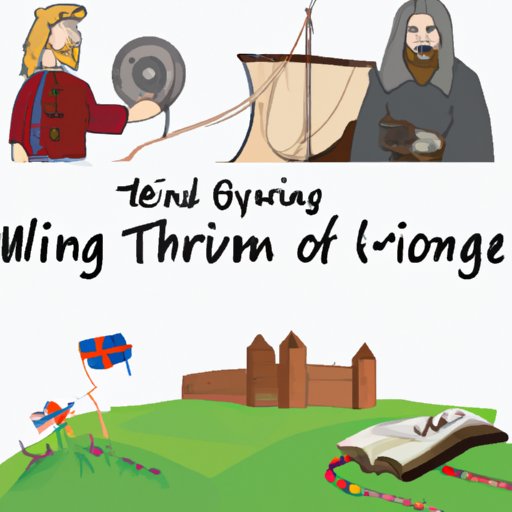Introduction
Anglo-Saxon culture is the culture of England during the period of Anglo-Saxon settlement (c. 450–1066 CE). This culture was characterized by a fusion of Germanic and Christian elements, which had a profound impact on the history and culture of England and beyond. In this article, we will explore the origins and development of Anglo-Saxon culture, its influence on modern times, and the differences between Anglo-Saxon and Viking cultures.
Exploring the Origins and Development of Anglo-Saxon Culture
The Anglo-Saxons were a group of Germanic tribes who migrated from northern Germany and Denmark to Britain in the 5th century CE. Their migration was part of a larger phenomenon known as the Migration Period, when various Germanic peoples moved across Europe in search of new lands. The Anglo-Saxons quickly established settlements in England, and their language and culture began to spread throughout the region.
The Anglo-Saxons expanded their territory by conquering existing British settlements, and they also engaged in trade and commerce with other regions. All of this helped to spread their culture even further. During this time, the Anglo-Saxons adopted Christianity as their religion, which had a profound effect on their culture. Christianization brought about changes in social structure, values, and beliefs, all of which would have a lasting impact on Anglo-Saxon culture.
Examining the Influence of Christianity on Anglo-Saxon Culture
The conversion to Christianity was a gradual process for the Anglo-Saxons, and it was met with resistance from some members of the community. Paganism and Christianity coexisted for many years, and there were periods of conflict between the two religions. Despite this, Christianity eventually became the dominant religion of the Anglo-Saxons.
Christianity had a major influence on Anglo-Saxon culture. It changed the social structure of society by introducing the concept of feudalism, and it also changed values and beliefs. Christianity emphasized the importance of charity, humility, and obedience, and these values became deeply entrenched in Anglo-Saxon culture.
Analyzing the Literary Achievements of Anglo-Saxon England
The Anglo-Saxons were prolific writers, and their works are some of the most important surviving pieces of Old English literature. They wrote both poetry and prose, often featuring themes such as heroism, loyalty, and honor. Epic poems and sagas were also popular, and they often featured heroic characters and mythical creatures.
One of the best-known works of Anglo-Saxon literature is Beowulf, an epic poem about a hero who defeats a monster. Other notable works include The Dream of the Rood, The Battle of Maldon, and The Wanderer. These works are still widely read today and provide insight into the culture and values of the Anglo-Saxons.
Investigating the Role of Women in Anglo-Saxon Society
Women in early Anglo-Saxon society were not considered to be equal to men, but they did have certain rights and privileges. They could own property, and they were allowed to participate in trade and commerce. Women were also respected as healers and leaders, and they played a significant role in religious ceremonies.
Women faced many challenges in Anglo-Saxon society, including limited legal rights and restrictions on their ability to inherit property. Despite these difficulties, women managed to carve out a place for themselves within the culture, and their contributions were recognized and appreciated.
Comparing and Contrasting Anglo-Saxon and Viking Cultures
Although the Anglo-Saxons and Vikings shared similar cultural roots, there were some distinct differences between the two cultures. The political and military structures of the two groups were quite different, as the Anglo-Saxons had a centralized government while the Vikings operated in a decentralized fashion. Social and cultural practices also differed, with the Anglo-Saxons being more focused on Christianity while the Vikings maintained their pagan beliefs. Economies and trade also varied, with the Anglo-Saxons engaging in agriculture while the Vikings relied heavily on fishing and raiding.
Assessing the Legacy of Anglo-Saxon Culture in Modern Times
The legacy of Anglo-Saxon culture can still be seen in modern Britain. The language of the Anglo-Saxons, Old English, has been preserved in the English language, and many of their literary works are still studied and enjoyed today. The art, music, and architecture of the Anglo-Saxons have also been preserved, and they continue to influence modern British culture.
The legacy of the Anglo-Saxons can also be seen in the British identity. The values of loyalty, honor, and courage that were so important to the Anglo-Saxons are still held in high esteem in modern British society, and the spirit of the Anglo-Saxons continues to be a source of pride and inspiration.
Conclusion
The Anglo-Saxons were a powerful force in European history, and their culture had a profound impact on the history and culture of England and beyond. From their origins to their lasting legacy, the Anglo-Saxons have left an indelible mark on the world. Their language, literature, art, music, and architecture are all evidence of the richness and complexity of their culture, and they continue to shape modern British identity and society.
(Note: Is this article not meeting your expectations? Do you have knowledge or insights to share? Unlock new opportunities and expand your reach by joining our authors team. Click Registration to join us and share your expertise with our readers.)
